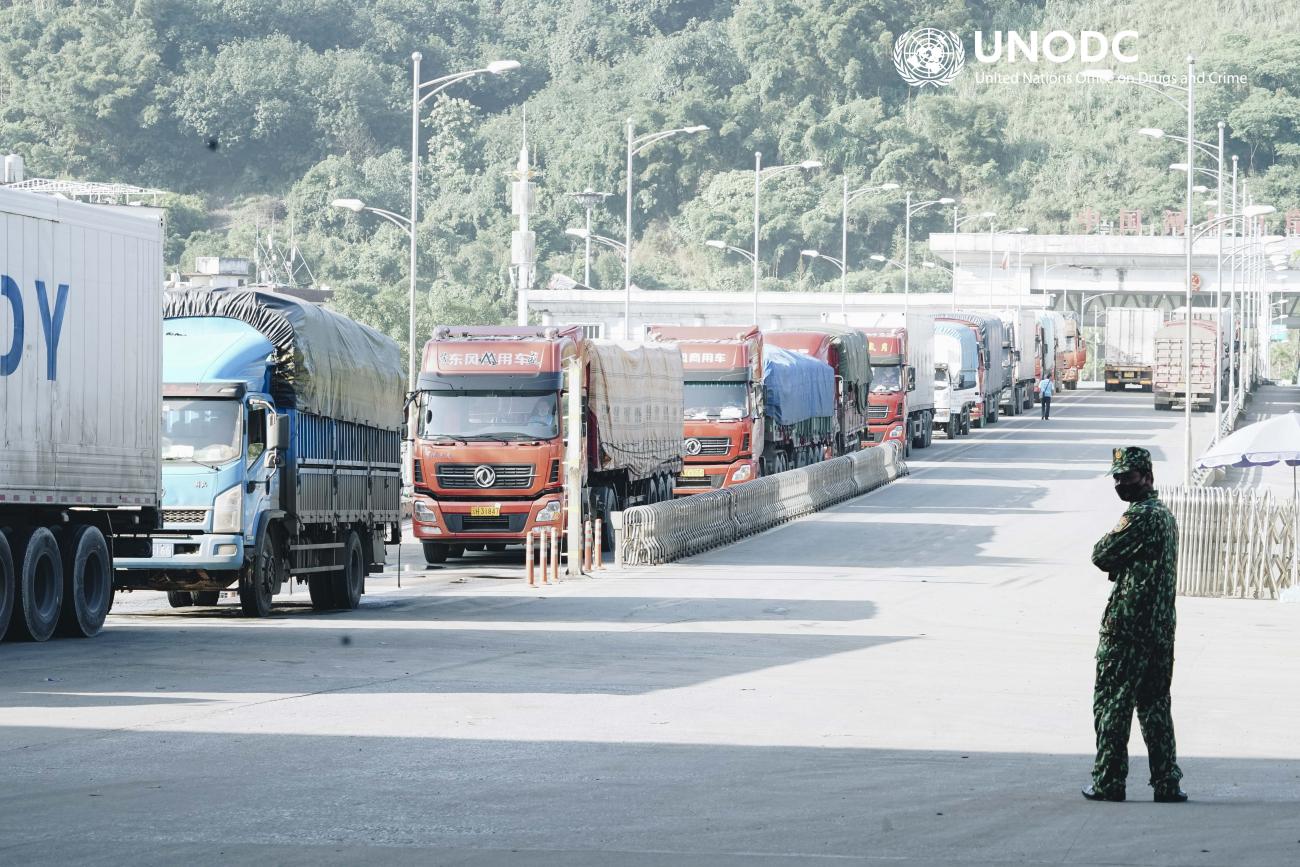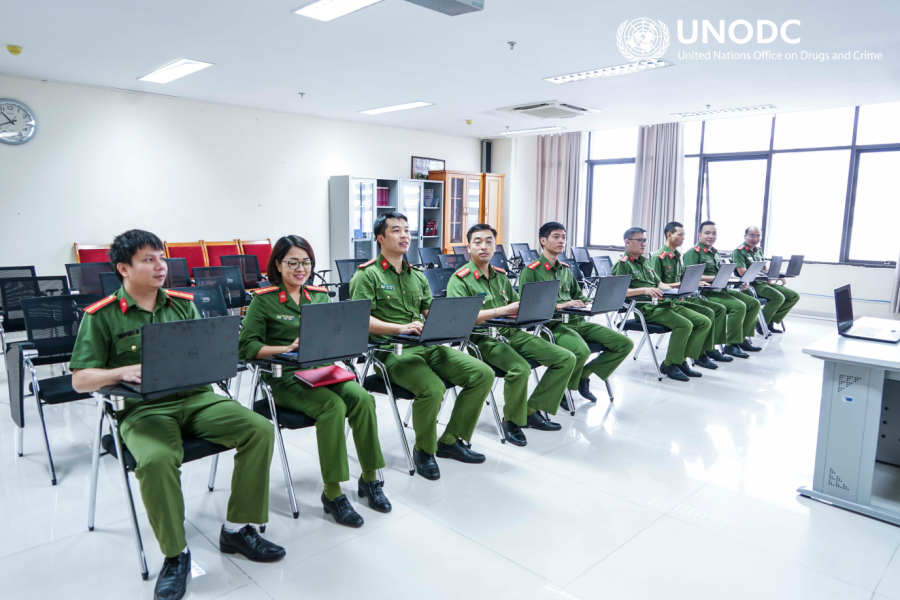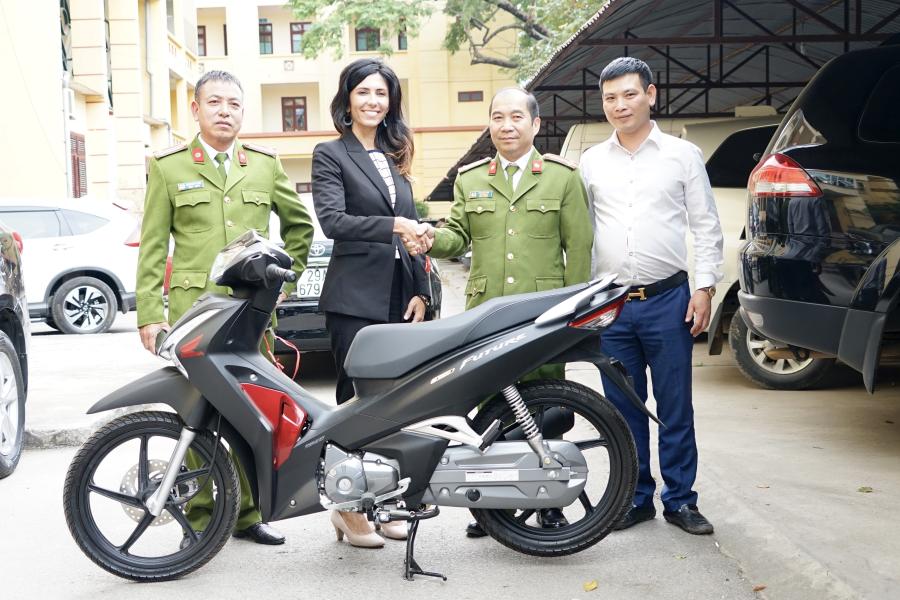Strengthening Border Management in Viet Nam to Counter Transnational Organized Crime

With support from United Nations on Drugs and Crime, Viet Nam is strengthening border management to fight against transnational organized crime
Transnational organized crime presents a serious threat to security and stability in Southeast Asia and neighboring regions, harming the health and wellbeing of individuals and communities, compromising and undermining economic development. Over the past decade, the security landscape in Southeast Asia has transformed. Historical patterns of transnational organized crime have accelerated, and new illicit markets have emerged, together generating billions of dollars each year for criminal organizations. In this changing environment, the United Nations Office on Drugs and Crime (UNODC) is working with member states in Southeast Asia to counter this threat to regional security.
Of the various types of illicit trafficking affecting Southeast Asia, the illicit drug trade is the most significant challenge today. The illicit drug market in Southeast Asia is the world’s largest, with production and trafficking estimated to be worth over US$70 billion in 2019. The regional drug trade has continued to grow during the COVID-19 pandemic despite border closures and strict travel restrictions intended to stop the spread of disease; the volume of methamphetamine seized in Viet Nam and other lower Mekong countries rose 19% over the previous year in 2020.[1] Viet Nam is utilized to be an transshipment point for criminal organizations,. Traffickers smuggle narcotics and other illicit goods across Viet Nam’s land borders with Cambodia and Lao PDR before shipping contraband overseas through the country’s major ports.
“There is a change in the movement of illicit drugs trafficking in the region,” said Ms. Valentina Pancieri, Regional Coordinator for UNODC’s Border Management Programme in Southeast Asia.
“Since 2019, to cope with law enforcement in the border areas of Myanmar and Thailand, criminals have again changed their routes. Illicit drugs such as methamphetamine and heroin have been transported through Lao PDR, Thailand, Cambodia and Vietnam, which shows that Vietnam is not only a drug market but also a transit that the criminals take advantage to traffick drug to third countries.”
The challenges authorities in Viet Nam face at border crossings are two-fold: mechanisms for coordinating investigations into transnational crime are underdeveloped, and the technical capacity of law enforcement agencies is limited. As a result, drug trafficking frequently goes undetected and investigations often end at national borders, culminating in individual arrests and seizures instead of trafficking rings and more significant disruptions to regional criminal networks.
To address these challenges, Viet Nam and neighboring countries in the Mekong basin cooperate to strengthen border management practices through the Regional Border Liaison Office (BLO) Network. With technical and policy support from UNODC, the Regional BLO Network has supported counter-drug trafficking efforts in the region since 1998 by providing a platform for real-time information sharing between cross-border counterparts and regional cooperation and facilitating technical capacity building activities for law enforcement officers. In addition, this network enhances the cooperation in combating against crime and drug trafficking across borders.
In Viet Nam, the Counter Narcotics Police Department of the Ministry of Public Security (MoPS) cooperates with UNODC, domestic counterparts, and foreign governments to address illicit trafficking at border crossings and the regional level. At operational BLOs, officers from multiple law enforcement agencies with mandates related to transnational organized crime—anti-narcotic police, criminal police, environmental police, customs, immigration, border guards, forestry enforcement, etc.—work together to share intelligence, coordinate investigations, and collect information related to illicit activity.
With members from different agencies, twenty-one BLOs in Viet Nam currently support effectively in conducting operations along the nation’s borders and cross the borders to interdict and prevent drug trafficking along high-risk routes. For instance, in February 2020, officers at a BLO in Sepon district worked with their cross-border counterparts from Lao Bao BLO, in Lao PDR, to support in arresting drug traffickers, seize 6,800 methamphetamine tablets, and to expand an ongoing investigation into drug trafficking in the area.[2]
At the regional level, the BLO network provides a forum to convene regional stakeholders and advance the policy dialogue on border management issues by convening regular workshops and consultations for governments represented in the network. At these meetings, delegates from BLOs and central authorities discuss challenges and share best practices among network to advance new policy solutions. In this way, the BLO network supports the strategic objectives of the ASEAN Political – Security Community by enhancing counter drug trafficking through improved border management practices.

UNODC and its regional counterparts, including MoPS, also mobilize the BLO network to build the capacity of frontline border officers. Officers from new and existing BLOs participate in regular trainings, cross-border workshops, and joint patrols to develop their technical ability. UNODC has also sponsored a number of national and international study tours for officers from Viet Nam to share best practices with foreign and domestic counterparts. Recently, UNODC has broadened its training approach to partner with national training academies in the region, including the Customs School and People’s Police Academy in Viet Nam. This effort aims to enhance the training offered to frontline officers of all ranks to place a greater emphasis on capacity building for investigation related to transnational organized crime and illicit trafficking.
In addition to offering training to frontline officers directly and through national academies, UNODC provides material support to new and existing BLOs in Viet Nam to enhance law enforcement operations at border crossings. It supports the expansion of the network and maintenance of existing locations, including providing officers with state-of-the-art technical equipment such as drug and precursor testing kits, crime scene investigation materials, and surveillance equipment.

According to Major General Do Duc Binh, Deputy Head of Vietnam Investigation Police Department on Drug-related Crimes, MoPS, “criminals are likely to take advantage of modern information technology, which makes criminal prevention more difficult. It is important to have modern equipment to support border officials in effectively detecting and preventing transnational organized crimes in the border areas.”
Although illicit activity has been implemented in border management in the region, there is an increasing trend of transnational crime with complexity and unprecedented risk. . By cooperating with regional partners and UNODC, MoPS, and the government of Viet Nam are working to ensure the region’s borders are protected from illicit trafficking.
The United Nations Office on Drugs and Crime (UNODC) works with countries to make the world safer from drugs, organized crime, corruption, and terrorism. UNODC is the guardian of the United Nations drug conventions: the United Nations Convention Against Transnational Organized Crime (UNTOC) and the United Nations Convention Against Corruption (UNCAC). UNODC’s Regional Office for Southeast Asia and the Pacific (ROSEAP) in Bangkok, Thailand serves as the hub for the organization’s activities in the region, including for programmes addressing transnational organized crime, alternative development, drug demand and harm reduction, criminal justice reform, and counterterrorism. Through these efforts, UNODC works with various government counterparts to advance the UN’s sustainable development agenda.
Based in ROSEAP, the Regional Border Management Programme was created to address the unique threats faced by governments in Southeast Asia—namely high rates of criminal activity and limited mechanisms for cross-border coordination—and has had an ongoing influence on security policy in the region. Through the Border Management Programme and BLO Network, UNODC supports law enforcement operations at frontline border crossings and contributes to policy dialogue on issues related to border management in the region. Vietnam joined the BLO network in 2000. At present, UNODC has supported the establishment of establish 21 BLOs in Vietnam along the country’s borders with Cambodia, China, and Lao PDR.
[1] UNODC report 2021 “Synthetic Drugs in East and Southeast Asia: latest developments and challenges”
[2] Source : Quảng Trị: Triệt phá vụ vận chuyển 6.800 viên ma túy tổng hợp | baotintuc.vn

